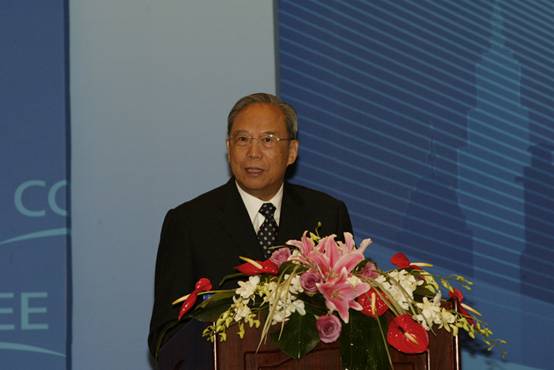CCIEE Hosts the Annual Meeting of China’s Economy (2010-2011) in Beijing
- Time:2011-02-24
On January 15, 2011, CCIEE hosted the Annual Meeting of China’s Economy in Beijing, under the theme of Analyzing China and World Economy. Zeng Peiyan, Chairman of CCIEE, addressed the opening ceremony. Li Yining, Dai Xianglong, He Keng, Lawrence Lau and Zhang Xiaoqiang delivered keynote speeches at the main forum. Wei Jianguo, Secretary General of CCIEE and Xu Gehui of Phoenix TV, co-chaired the opening ceremony. The participants analyzed the trend of China and world economy, and made several proposals on formulating the “12th Five-Year Plan” and transforming China’s economic development mode.

In Zeng Peiyan’s address, he hoped that the participants could strengthen research on strategic, macroeconomic and forward-looking issues relating to economic development; offer far-sighted solutions to the prominent problems and contribute their wisdoms to China’s steady and rapid economic development.
Participants expressed their views on the following four topics: 2011 China’s Macroeconomy, International Economic Insights, Challenges and Opportunities in the Period of “12th Five–Year Plan”, and Exploration of Transforming China’s Economic Development Mode.
Almost all the participants believed that the world economy will recover slowly in 2011 after it reached the bottom quickly during the financial crisis and then experienced difficult recovery. The continuous US Fed quantitative easing monetary policies, the sovereign debt crisis in Europe, the persistent economic downturn in Japan, the challenge of hot money floods in emerging economies and asset bubbles and inflationary pressure, all these factors will have direct or indirect impact on China’s economic development. Therefore, China should grasp its new position in the division of global economy, take domestic and international situation into account, foster strengths and circumvent weakness and create new advantages when participating international economic cooperation and competition.
Also, participants considered the stability of the general price level as the most urgent task of macro-control. Besides, they made the following recommendations: it is necessary to adjust the moderately easy monetary policy to a steady one and meanwhile, to take active measures preventing the imported inflation. In terms of price control, government should mainly focuses on indirect control, with direct control policies combined, and give the fundamental role of market forces into full play in allocating resources. We should also promote structural adjustment, strengthen support on high-tech industry, strategic and emerging industry, education, public health and ecology, while adjusting the gross volume properly.
Participants pointed out that China’s economy will continue to grow in the period of “12th Five-Year Plan”. Industrialization, informatization, urbanization, internationalization and socialization will create huge market demand, which is the unique advantage of China and can not be duplicated. However, problems like the “middle-income trap”, decreasing “demographic dividend”, ever-increasing gap between the rich and poor are likely to emerge in the future. Taking the above factors into account, we should adhere to the principle of “scientific development”, accelerate the transformation of economic development mode in the next five years. Furthermore, we should use institutional and systematic innovations as breakthrough points to resolve the deep-rooted contradiction in economic development, and provide impetus for steady development in the long-term.
More than 500 guests attended the meeting, including government officials of ministries, head of local governments, scholars and experts of research institutes, entrepreneurs, diplomatic envoys and representatives of international organizations and think tanks.
